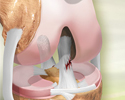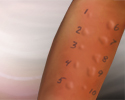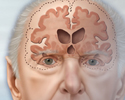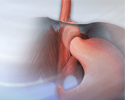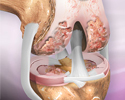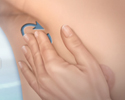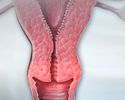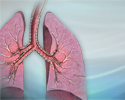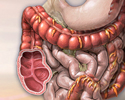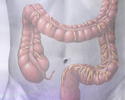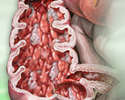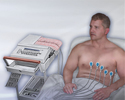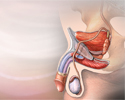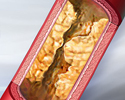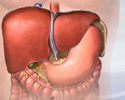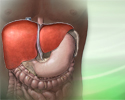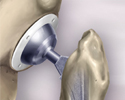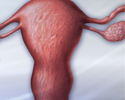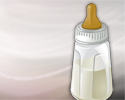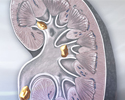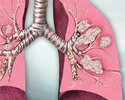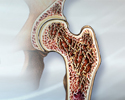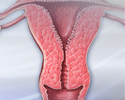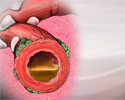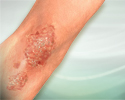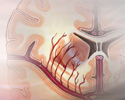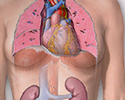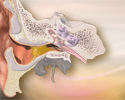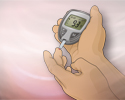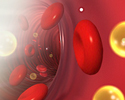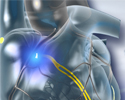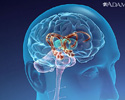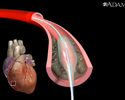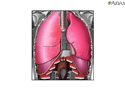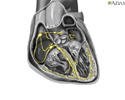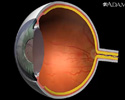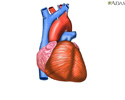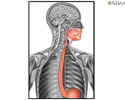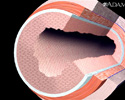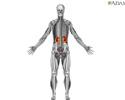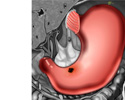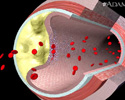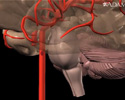Nuclear stress test
Your heart is the engine that keeps blood pumping throughout your body. When your heart doesn't work as well as it should, your body can't function normally. If you've had heart problems in the past, your doctor may recommend that you have a test to see how well your blood is flowing into your heart. Let's talk today about thallium and sestamibi stress test, also known as nuclear stress test.
This is your heart. It's job is to receive oxygen-poor blood from your body, send it to your lungs to pick up fresh oxygen, then pump that oxygen-rich blood back out to your body. When your heart doesn't get enough blood, it can't work as well as it should.
So, why would you need a thallium or sestamibi stress test?
Well, your doctor may recommend that you have this test to find out why you're having chest pain, find out which treatment is best for your heart disease, check whether a treatment you've already had, such as medicine or surgery, is working, or see if you have coronary artery disease.
So, what happens during the stress test?
Well, you'll start to prepare for the stress test a day ahead of time. Don't eat anything the night before the test, and avoid any foods that contain caffeine for a full day beforehand. You'll have to skip your morning cup of coffee or tea, and avoid sodas and chocolate. Your doctor will let you know if you need to stop taking any of your medicines before the test.
When you arrive at the doctor's office or medical center for the test, an intravenous, or IV line will be placed into your vein. Through this line, a weakly radioactive substance will be injected into one of your veins. You'll lie down and wait for 15 to 45 minutes, and a special camera will take pictures as the thallium or sestamibi substance moves into your heart during a period of rest.
Then you'll walk on a treadmill with EKG electrodes monitoring your heart activity. Once you've reached your maximum level of exercise you'll get another injection of the radioactive substance and your heart will be scanned to see how well the blood is flowing during a period of "stress." If you can't exercise, you'll get a drug that will simulate the effects of exercise by making your heart beat faster.
During the test, some people feel chest pain, shortness of breath, dizziness, or a fast heartbeat. Let the person who is doing the test know right away if you don't feel well.
So, what do the test results mean?
Well, your doctor will compare the first set of images to the second set, to see if you have heart disease or your heart disease is getting worse. If blood is flowing well through the arteries of your heart, then your test is normal. If blood isn't flowing well, you may have a blockage in one or more of the coronary arteries of your heart. In that case, you may need to have another test, or an angiography, stent or heart bypass surgery to open up a blocked artery.
A stress test can help your doctor see how well your heart is working. Then, you can find out together which treatments you'll need to get your blood pumping smoothly again.
Nuclear stress test
Review Date: 6/25/2020
Reviewed By: Micaela Iantorno, MD MSc FAHA RPVI, Interventional Cardiologist at Mary Washington Hospital Center, Fredericksburg, VA. Also reviewed by David Zieve, MD, MHA, Medical Director, Brenda Conaway, Editorial Director, and the A.D.A.M. Editorial team.
Videos
Browse All
- Abdominal aortic aneurysm
- Abdominal pain
- ACL injury
- Acne
- Adenoid removal
- Adolescent depression
- After your child's ear tube su...
- After your child's inguinal he...
- After your child's tonsil or a...
- After your child's umbilical h...
- Alcoholic liver disease
- Allergic rhinitis
- Allergies
- Allergy testing
- Allergy to mold - animal dande...
- Alzheimer disease
- Anemia
- Ankylosing spondylitis
- Anterior shoulder stretch
- Anti-reflux surgery
- Appendectomy
- Appendicitis
- Arm reach
- Arthritis
- Asperger syndrome
- Asthma
- Asthma - children
- Atopic dermatitis
- Atrial fibrillation
- Attention deficit hyperactivit...
- Autism spectrum disorders
- Basal cell carcinoma
- Before a child's tonsil or ade...
- Bipolar disorder
- Breast cancer
- Breast engorgement
- Breast self-exam
- Breastfeeding
- Bronchitis
- Bronchoscopy
- Cardiac catheterization
- Carpal tunnel syndrome
- Cataracts
- Cerebral palsy
- Cervical cancer
- Chest pain
- Childhood obesity
- Cholesterol and triglyceride t...
- Chronic obstructive pulmonary ...
- Cluster headache
- Cold treatments for kids
- Colon cancer
- Colon cancer screening
- Colorectal polyps
- Common cold
- Concussion
- Crohn disease
- C-section
- Cystic fibrosis
- Cystic fibrosis - nutritional ...
- Depression
- Diabetes
- Dialysis
- Diarrhea
- Ear infection - acute
- Ear infection - chronic
- Ear tube insertion
- Earache
- Electrocardiogram
- Endometriosis
- Enlarged adenoids
- Enlarged prostate
- Epilepsy
- Erection problems
- Essential hypertension
- External rotation with band
- Fibromyalgia
- Flu
- Food poisoning
- Foot pain
- Gallstones
- Gastroesophageal reflux diseas...
- Gastroesophageal reflux in inf...
- Getting rid of lice in the hom...
- Glaucoma
- Hardening of arteries
- HbA1c
- Head injury
- Head lice
- Healthy Guide to Fast Food
- Hearing loss
- Heart attack
- Heart failure
- Heel pain
- Hepatitis A
- Hepatitis B
- Hepatitis C
- Hernia
- Herniated disk
- Hip joint replacement
- Hodgkin lymphoma
- How do ear tubes come out?
- How to remove a splinter
- How to stop bedwetting
- How to treat a nosebleed
- How to treat a sunburn
- How to use a peak flow meter
- How to use a pill cutter
- How to use eye drops
- How to use nasal sprays
- Hypertension
- Hyperthyroidism
- Hypothyroidism
- Hysterectomy
- Infant formulas
- Inguinal hernia repair
- Inhaler with no spacer - adult...
- Inhaler with no spacer - child...
- Inhaler with spacer - adults
- Inhaler with spacer - child
- Insomnia
- Internal rotation with band
- Iron deficiency anemia
- Irritable bowel syndrome
- Isometric
- Kidney stones
- Knee joint replacement
- Let's talk about pink eye
- Lung cancer
- Lyme disease
- Melanoma
- Menopause
- Migraine
- Multiple sclerosis
- Nasal congestion
- Neck pain
- Newborn jaundice
- NICU consultants and support s...
- Nuclear stress test
- Obstructive sleep apnea
- Osteoarthritis
- Osteoporosis
- Pap smear
- Pendulum exercise
- Peptic ulcer
- Pharyngitis
- Plantar fasciitis
- Pneumonia
- Pregnancy care
- Prepare for your child's ear t...
- Prepare for your child's herni...
- Prostate cancer
- Psoriasis
- Rheumatoid arthritis
- Rotator cuff problems
- Sciatica
- Scoliosis
- Seizures
- Shingles
- Shoulder blade retraction
- Shoulder blade retraction with...
- Shoulder pain
- Sinusitis
- Sleep disorders
- Smoking tips to quit
- Spinal stenosis
- Stent
- Storing breast milk
- Strep throat
- Stretching back of your should...
- Stroke
- Systemic lupus erythematosus
- Tension headache
- The difference between a cold ...
- Tips on buying cold and flu me...
- Tips on removing ear wax
- Tonsillectomy
- Tonsillitis
- Tracking your blood pressure a...
- Treating congestion in babies...
- Treating eyelid bumps
- Type 1 diabetes
- Type 2 diabetes
- Ulcerative colitis
- Understanding cholesterol resu...
- Up the back stretch
- Urinary incontinence
- Urinary tract infection - adul...
- Uterine fibroids
- Vacation health care
- Varicose veins
- Venous insufficiency
- Wall push-up
- Wall stretch
- Warts
- What are hives?
- What are night terrors?
- What causes wheezing?
- What in the world is a neti po...
- What is tennis elbow?
- What makes your heart beat?
- What to do when kids put thing...
- What to do when kids put thing...
- What to do when something gets...
Animations
Browse All
- Allergies
- Alzheimer disease
- Ankle ligament injury
- Arrhythmias
- Atherosclerosis
- Athetosis resulting from basal...
- Balloon angioplasty - short se...
- Bladder function - neurologica...
- Blinking
- Blood clotting
- Blood flow
- Blood pressure
- Bone fracture repair
- Brain components
- Breast lift
- Breathing
- Bunion
- Cancer of the throat or larynx...
- Cardiac conduction system
- Cardiomyopathy
- Cardiovascular system
- Cataract
- Cell division
- Cerebral aneurysm
- Cesarean section
- Components of skin
- Conception - general
- Conception - pregnancy
- Conception of identical twins...
- Concussion
- Corneal injury
- Coronary artery bypass graft (...
- Coronary artery disease
- Cosmetic surgery of the face
- Coughing
- Diabetes - retinal conditions...
- Digestion
- Directional coronary atherecto...
- Early labor
- Egg cell production
- Egg production
- Endocrine glands
- Enlarged prostate gland
- Epinephrine and exercise
- Exercise
- Feeling pain
- Fetal ear development
- Formation of twins
- Gas exchange
- Glaucoma
- Gout
- Hearing
- Hearing and the cochlea
- Heart bypass surgery
- Heart formation
- Heartbeat
- Heartburn
- Herniated nucleus pulposus (sl...
- Homeostasis
- Human face formation
- Hypertension - overview
- Immune response
- Intracytoplasmic sperm injecti...
- Kidney stones
- Kids - How big is the baby?
- Kids - How does the baby come ...
- Kids - Is it a girl or boy?
- Kids - Umbilical cord
- Kids - Where do babies come fr...
- Liposuction
- Lymph nodes
- Lymphatics and the breast
- Macular degeneration
- Muscle types
- Nerve conduction
- Nervous system formation
- Nutrient exchange
- Osteoarthritis
- Osteoporosis
- Ovulation
- Parkinson disease
- Percutaneous transluminal coro...
- Peristalsis
- Phagocytosis
- Pituitary gland
- Placenta delivery
- Placenta formation
- Preeclampsia
- Pregnancy
- Red blood cell production
- Reflex response
- Retina
- Retinal detachment
- Rupturing membranes
- Seeing
- Sexual differentiation
- Shoulder joint dislocation
- Skeletal formation
- Skeletal muscle
- Skeletal system components
- Skin conditions
- Smelling
- Smoking
- Snoring
- Sperm production
- Sperm release pathway
- Stomach ulcer
- Stomach ulcer
- Stroke
- Stroke - secondary to cardioge...
- Sun's effect on skin
- Swallowing
- Sweating
- Tachycardia
- Tasting
- The role of amniotic fluid
- Tobacco use - effects on arter...
- Twin-to-twin transfusion syndr...
- Ultrasound
- Urination
- Vaccines
- Vaginal delivery
- Vasectomy




